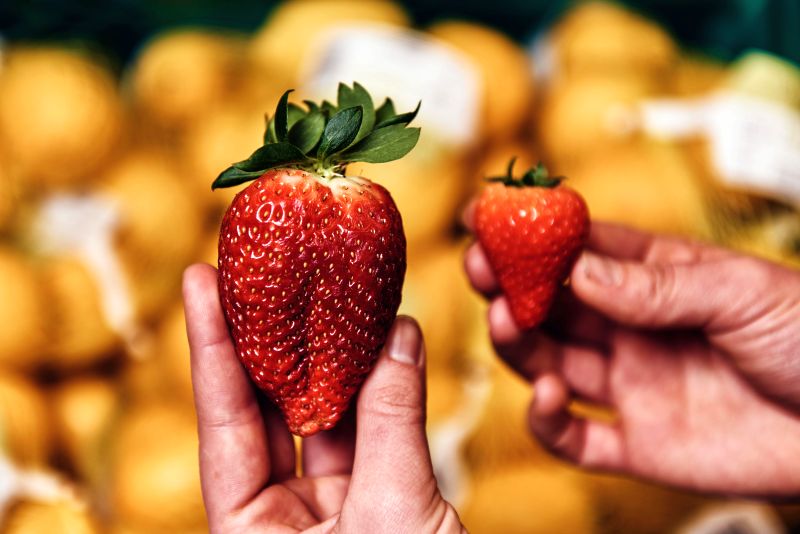
Sales of misshaped fruit and vegetables have soared amid calls for retailers to be more flexible when setting crop specifications.
British consumers can't get enough misshaped fruit and vegetables, according to new figures produced by consumer analysts Kantar Worldpanel.
Sales of Morrisons' Wonky fruit and vegetables have more than tripled, says Kantar, helping to boost overall sales figures at the country's fourth biggest supermarket.
Morrisons launched its wonky initiative just over two years ago to provide a discounted line for consumers shopping on a budget and help reduce waste on the farm.
It followed a TV show by celebrity chef Hugh Fearnley-Whittingstall in which he criticised the waste of "ugly" produce.
One grower told FarmingUK that the initiative had helped him - increasing yield by about five per cent by providing a market for vegetables that would have otherwise gone to waste.
But farmers' leaders are more cautious about the scheme. They would prefer retailers to be more flexible when setting specifications for Class 1 produce.
David Simmonds of Riviera Produce in Cornwall, who grows cauliflowers, cabbages and courgettes, has been supplying Morrisons' wonky vegetables scheme for two years.
He said his yield had increased by about five per cent by reducing waste from the field. This was not insignificant, he said, at a time when margins were so tight.
"Cauliflowers are particularly difficult to get right all the time," said Mr Simmonds. "They are a very difficult crop to grow.
"You can get yellow or creamy heads or you can get gaps in the florets. The weather can make a difference and you can't control the weather. If you get hot weather the cauliflowers can get bleached.
"Previously they would have just been left in the field. They would have gone to waste. This way we can now increase our sales - we get more from the crop - and at the same time the consumer gets a good deal in the shops."
'Flexible'
However, Jack Ward, chief executive of the British Growers Association, called on retailers to be more flexible on specifications for Class 1 fruit and vegetables.
"Growers don't set out to grow wonky vegetables. They try to grow Class 1 vegetables. That is where they hope to make money - by growing vegetables that command a decent price," he said.
"They don't particularly want to be producing at discount. The cost of producing those vegetable is still the same, whether it is wonky or not."
Mr Ward said many growers already had alternative outlets for produce that didn't meet Class 1 standards.
"It is handy to have alternative outlets but quite a lot of growers will use the food processing industry. It doesn't matter whether carrots are bent or not if they are going to be diced or shredded," he explained.
"Growers strive to grow Class 1 produce but what would really help is a bit more flexibility on specification. We don't know what the Almighty is going to send us when specifications are set.
"Every season sends its own problems. Last year we had a relatively cold Spring and a wet Summer. This year we have had a cold spell followed by a hot spell.
Mr Ward added: "Every change changes how a plant is going to grow, so setting very tight specifications months earlier makes it difficult. It would help if both consumers and retailers could be a little more flexible."
'As much crop as possible'
His sentiments were echoed by the NFU, who called it important for retailers to apply flexibility.
A spokesman told FarmingUK: “It is important that retail buyers apply flexibility to food specs and promotions in order to utilise as much of the crop as possible, and to manage fluctuations in supply and demand.
"It costs just as much to produce a wonky fruit and veg as a perfect one, so special ranges can only ever be part of the solution to address the food waste challenge.
"Flexible solutions avoid produce being wasted and enable more of the crop to be sold to the British public. These solutions are most successful when farmers and retailers have an open and transparent relationship.”
A Morrisons spokesman added: "Our Wonky brand goes right to the heart of Morrisons as a food maker. Dealing direct with British farmers and growers and with our own manufacturing business, we’re able to utilise more of the whole crop of fruit and veg….for example selling bigger and smaller apples or selling a misshaped carrot, both still great eating quality, while of course minimising waste."
The latest Kantar Worldpanel grocery survey covered the 12-week period up to June 17 this year. It showed that, amongst the big four supermarkets, Morrisons was again the fastest growing, posting a sales increase of 1.9 per cent.
Fraser McKevitt, head of retail and consumer insight at Kantar said: “Consumers have responded very well to Morrisons’ wonky fruit and vegetable lines – these have more than tripled in sales and now feature in 12 per cent of baskets, helping the retailer’s cheapest tier of own label products grow by a remarkable 18 per cent."
